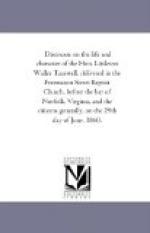Whatever may have been the rate of legal compensation in 1802, some description of the leading members of the bar of that day is indispensable to the canvas, of which Mr. Tazewell is the principal figure. Besides Hyott, who lived in the retired mansion in which our venerable fellow-citizen, John Southgate, now resides, and whose name has long been extinct, and Marsh, who studied in the famous law school of Judge Reeves, at Lichfield, where Calhoun was initiated in the mysteries of the law, who built that handsome wooden house in the fields, long since burned down, in which the youth of my day were flogged through the rudiments of Ruddiman, and whose sons are among the enterprising merchants and sea-captains of our modern city, was, first and foremost, General Thomas Mathews. There he stands, with the figure of Apollo and with the spirit of Mars, clad in the blue and buff of the revolution, wearing that sword which he had worn through the struggle with the mother country, his well-powdered head surmounted by the old cocked hat which he had worn when driven from Fort Nelson by the myrmidons of his British namesake, and at the siege of York, and with that long queue, the dressing of which was the no mean labor of the toilet of that era. To his dying day, which happened on the eve of the late war with Great Britain, though a general of brigade, on all stated musters he appeared in the field in full uniform, and was greeted by old and young with applause. He was a native of St. Kitts, left the island before the revolution, performed his part gallantly through the entire contest for independence, and had long been a member of the House of Delegates, of which he was again and again elected speaker, performing the duties of the chair with a dignity, firmness, and grace still freshly remembered,




